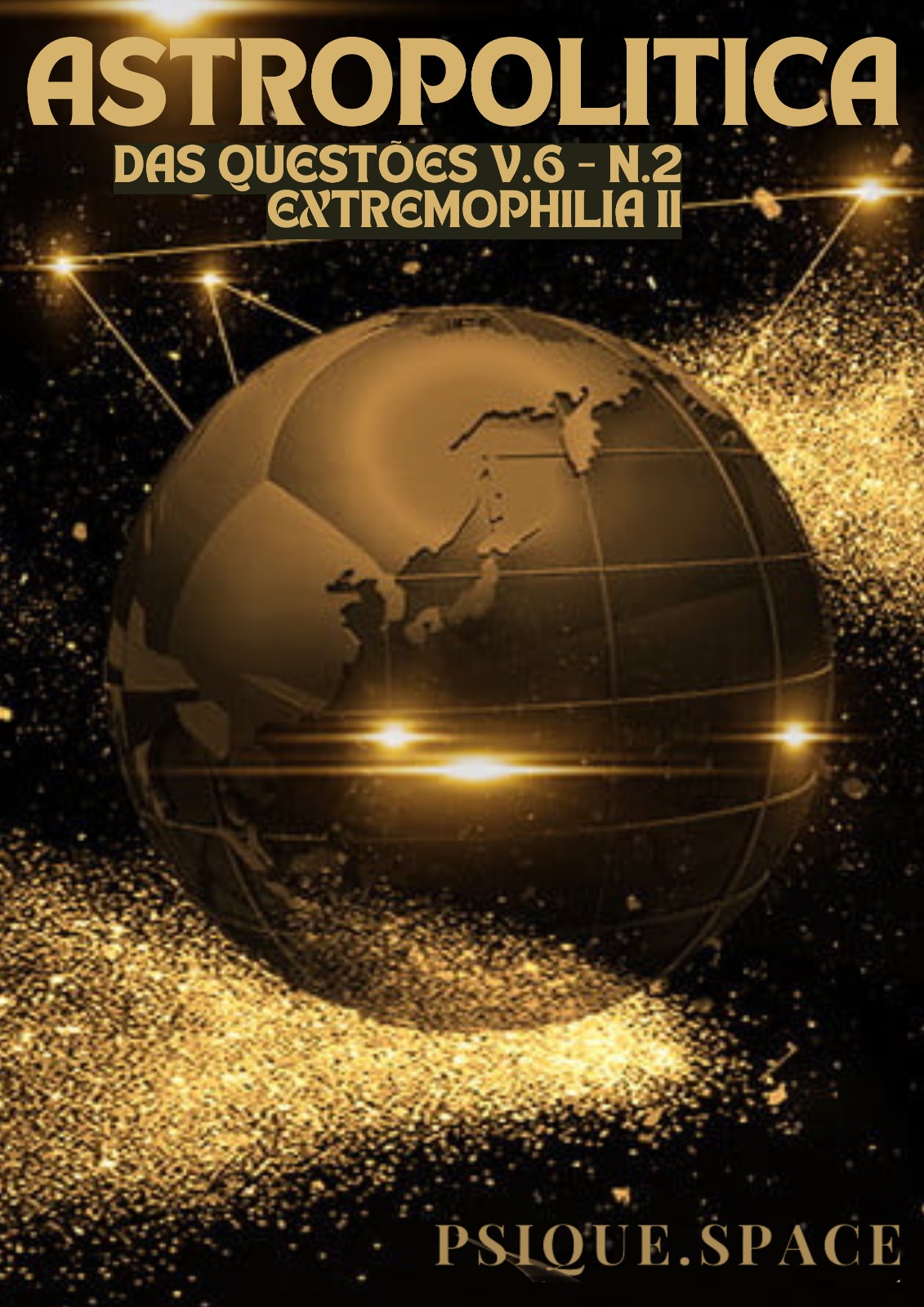PER ASPERA AD ASTRA:
filosofía de la astrobiología, el problema de la extinción y los caminos éticos del futuro
Keywords:
Filosofia da astrobiologia, astrobioética, extinção, capitalismo cósmico, SETIAbstract
Resumo. O objetivo deste artigo é refletir sobre uma disciplina pouco estudada na língua espanhola: a filosofia da astrobiologia. Institucionalizada como campo do conhecimento no século XX, os problemas colocados pela astrobiologia (busca da vida no cosmos, o lugar do sujeito no universo, reformulações radicais na formação do conhecimento científico, desenvolvimentos no campo tecnológico, o problema de extinção, entre tantos outros) são centrais para pensar como a humanidade é concebida no presente e, principalmente, no futuro. Daí decorre que esta disciplina investiga problemas de ordem ontológica, epistemológica, política, ética e, inclusive, religiosa. O artigo busca investigar alguns desses problemas para destacar a importância da astrobiologia na filosofia.
Downloads
References
ARETXAGA-BURGOS, Roberto. Hacia una filosofía de la astrobiología. Pensamiento, núm. 269, p. 1083-1118, 2015.
ARETXAGA, Roberto.; CHELA-FLORES, Julian. Biocentrismo y filosofía (II). Letras de Deusto, 36 (110), p. 30-35, 2008.
CERCEAU, Florence Raulin. Pioneering Concepts of Planetary Habitability. In: D.A. Vakoch (Ed.), Astrobiology, History, and Society. Life Beyond Earth and the Impact of Discovery. Berlin-Heidelberg: Springer-Verlag, 2013, p. 121-122.
CHON-TORRES, Octavio Alfonso. Astrobioethics. International Journal of Astrobiology, 17 (1), p. 51-56, 2017.
DICK, Steven. The Postbiological Universe. 57Th International Astronautical Congress, p. 1-10, 2006.
HEGEL, Georg Wilhelm Friedrich. Vorlesungen über die Philosophie der Natur 1819/1820. In: M. Bondeli; H.N. Seelmann (Hg.), Vorlesungen. Ausgewählte Nachschriften und Manuskripte, Band 16. Hamburg: Felix Meiner Verlag, 2002, p. 65-66
LUPISELLA, Mark.; LOGSDON, John. Do we need a Cosmocentric Ethic?. International Astronautical Congress, p. 1-10, 1997.
MARGULIS, Lynn. Planeta simbiótico. Un nuevo punto de vista sobre la evolución. Trad. Victoria Laporta Gonzalo. Barcelona: Editorial Debate, 2002, p. 45.
MARRINER, Nick.; MORHANGE, Christophe.; SKRIMSHIRE, Stefan. Geoscience meets the four hoursemen? Tracking the rise of neocatastrophism. Global and Planetary Change, 74, 2010 43-48.
MEILLASSOUX, Quentin. Después de la finitud. Ensayo sobre la necesidad de la contingencia. Trad. Margarita Martínez. Ciudad Autónoma de Buenos Aires: Caja Negra Editora, 2015, p. 87-88.
MORE, Max. The Extropian principles version 3.0. A transhumanist declaration. MROB. 4 de mayo del 2023, Recuperado de https://www.mrob.com/pub/religion/extro_prin.html
NAUDÉ, Wim. Extraterrestrial Artificial Intelligence: The Final Existential Risk?. IZA Institute of Labor Economics, p. 1-29, 2023.
NIINILUOTO, Ilkka. Truth-Seeking by Abduction. Cham: Springer Nature Switzerland AG, 2018, p. 152.
SAPIO, Lo Luca. The ethics of astrobiology: Humanity’s place in the cosmos and the extinction problem. Frontiers in Astronomy and Space Sciences, vol. 9, p. 1-5, 2022.
STENGER, Victor J. The Fallacy of Fine-Tuning. Why the Universe is not designed for us. New York: Prometheus Books, 2011, p. 36-38.
SULLIVAN, Woodruff T. III. Extraterrestrial Life as the Great Analogy, Two Centuries Ago and Modern Astrobiology. In: D.A. Vakoch (Ed.), Astrobiology, History, and Society. Life Beyond Earth and the Impact of Discovery. Berlin-Heidelberg: Springer-Verlag, 2013, p. 73-84.
ROBLES, Gustavo. La teoría del reconocimiento de Axel Honneth. In: A. Camou (Coord.), Cuestiones de teoría social contemporánea. EDULP, 2023, p. 881-905.
RODRÍGUEZ-MANFREDI, José Antonio. La innovación tecnológica en la astrobiología como motor de cambio en la mentalidad actual. Letras de Deusto, vol. 38 (118), p. 68-75, 2008.
ROMANOVSKAYA, Irina K. Planetary biotechnospheres, biotechnosignatures and the search for extraterrestrial intelligence. International Journey of Astrobiology, 22 (6), p. 663-695, 2023.
ROMERO, Gustavo E. La filosofía científica y los límites de la ciencia. Revista Científica de Estudios e Investigaciones, 6(1), p. 97-103, 2017.
ROSS, Joseph T. Hegel, Analogy and Extraterrestial Life. In: D.A. Vakoch (Ed.), Astrobiology, History, and Society. Life Beyond Earth and the Impact of Discovery. Berlin-Heidelberg: Springer-Verlag, 2013, p. 86-100
SZOCIK, Konrad.; ABYLKASYMOVA, Rakhat. If extraterrestrial intelligence exists, it is unable to recognize humans as intelligent beings. International Journey of Astrobiology, 21 (6), p. 462-468, 2022.
VACCARI, Andrés. Transhumanism and human enhancement: A post-mortem. Bioethica Forum, vol. 8 (1), p. 23-24, 2015.
VALERO, Alicia; VALERO, Antonio, CALVO, Guiomar. The Material Limits of Energy Transition: Thanatia. Cham: Springer Nature Switzerland AG, 2021, p. 239.
WARD, Peter.; BROWNLEE, Donald. Rare Earth. Why Complex Life is Uncommon in the Universe. New York: Copernicus Books, 2003, p. 243.
Downloads
Published
How to Cite
Issue
Section
License
Copyright (c) 2024 Das Questões

This work is licensed under a Creative Commons Attribution-NonCommercial 4.0 International License.
Authors who publish in this journal agree to the following terms:
Authors maintain the copyright and grant the journal the right of first publication, the work being simultaneously licensed under the Creative Commons Attribution License which allows the sharing of the work with recognition of the authorship of the work and initial publication in this journal.
Authors are authorized to take additional contracts separately, for non-exclusive distribution of the version of the work published in this journal (eg publish in institutional repository or as a book chapter), with acknowledgment of authorship and initial publication in this journal.
Authors are allowed and encouraged to publish and distribute their work online (eg in institutional repositories or on their personal page) at any point before or during the editorial process, as this can generate productive changes as well as increase the impact and the citation of the published work.



